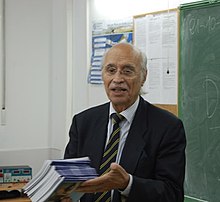Antonio García-Trevijano
show This article may be expanded with text translated from the corresponding article in Spanish. (July 2016) Click [show] for important translation instructions. |
Antonio García-Trevijano Forte | |
|---|---|
 Antonio García-Trevijano Forte | |
| Born | Antonio García-Trevijano Forte 18 July 1927 |
| Died | 28 February 2018 (aged 90) |
| Other names | Maverick[1] |
| Citizenship |
|
| Education | University of Granada |
| Occupation | Lawyer, notary public, jurist, politician, philosopher and art critic |
| Known for | Democratic Junta of Spain, Democratic Convergence Platform, Platajunta, MCRC |
| Spouse(s) | Francine Chouraki Levent |
| Children | 2 |
| Parent(s) | Antonio García-Trevijano and Ángeles Forte |
| Website | |
Antonio García-Trevijano Forte (18 July 1927 – 28 February 2018) was a Spanish republican lawyer, notary public, jurist, philosopher, art critic, author and political activist. Born in Alhama de Granada, he was a prominent figure in the opposition to the Francoist dictatorship.
Political activism[]
In 1974 García-Trevijano organised meetings in Paris between Don Juan de Borbón and the republican groups plus the publishing group , in which the legitimate heir to the Spanish throne expressed his rejection of Franco's decree appointing his son Juan Carlos as his successor.[2] He acted as a promoter of political freedom throughout Spain and was the leader of the Citizens' Movement towards the Constitutional Republic of Spain (MCRC).[3]
Repression[]
He was tried for high treason before the Court of Public Order (Marshal of Ghent) because of his intervention in Equatorial Guinea; he was integral in helping put the dictator Francisco Macías Nguema in power.[4] He has had five passports withdrawn, suffered three arrests and two fines, was the victim of a serious attack for his declarations to the BBC when Franco was dying,[5] and was prosecuted by the Public Order Court (Gómez Chaparro) for an offense against the State and imprisoned for four months by order of Manuel Fraga Iribarne.[6]
Bibliography[]
García-Trevijano wrote a blog[7] and in the Journal of the Constitutional Republic. A political analyst in the Spanish press, he wrote more than 50 articles in the Reporter magazine, over a thousand articles in ABC, El País, El Independiente, El Mundo, and La Razón. He has written several monographs in private law, a short book titled The Truth of my Intervention in Guinea.[8] He has also written the books The Democratic Alternative, The Discourse of the Republic, Confronting the Big Lie—which has been published in English with the title A Pure Theory of Democracy[9] by the University Press of America, Passions of servitude, an art book titled Donatello, Sculptor of the Childhood, and a book on philosophy of art entitled From Modernity to Modernism. Atheism Aesthetic: Art of the Twentieth Century. He has also written prologues to Palace of Injustice and El País: Culture as Business.
Personal life[]
García-Trevijano was Professor of Commercial Law at the University of Granada and a notary, and worked as an attorney in Madrid from 1960 until his death. He died on 28 February 2018 from natural causes. He was 90 years old.
Notes and references[]
- ^ SPANISH OPPOSITION LAWYERS AND VENEZUELAN NEWSMAN BEATEN BY MASKED ASSAILANTS
- ^ "Spain's opposition groups demand urgent action from new king". The Times. 25 November 1975.
- ^ MCRC website
- ^ "pnpa46_03.html". mongobeti.arts.uwa.edu.au. Retrieved 2019-12-23.
- ^ "Madrid Lawyers beaten up". The Times: 4. 7 November 1975.
- ^ "Spanish regime bans press conference by opposition alliance". The Times: 7. 30 March 1976.
- ^ García-Trevijano's blog
- ^ The Truth of my Intervention in Guinea
- ^ "A Pure Theory of Democracy". Archived from the original on 2011-07-27. Retrieved 2019-09-30.
- García-Trevijano Forte, Antonio. Pasiones de servidumbre. 2001. Madrid: Foca ISBN 84-95440-07-5
- García-Trevijano Forte, Antonio. Frente a la gran mentira. 1996. Madrid: Espasa Calpe. ISBN 84-239-7741-2
- García-Trevijano Forte, Antonio. "A pure theory of democracy"
- García Viñó, Manuel. El País: La cultura como negocio. 2006. Tafalla: Txalaparta. ISBN 84-8136-456-8
- Archivo Juan J. Linz sobre la transición española [1]
- "C.E. Camacho sale Trevijano se queda". 1976. Triunfo 697,11
- "Brutal atentado contra un grupo de profesionales". November 7, 1975. Informaciones.
- The Times Madrid correspondent. "Opposition to hold summit meeting in Madrid today". September 4, 1976. The Times, 3.
- Secretary of US State Kissinger. CONFIDENTIAL STATE 135254. EUROPEAN COMMUNITY AND SPAIN: OPPOSITION CAUSES CONTROVERSY. 10 June 1975.
- Martínez Reverte, Javier. Habla el conde de Barcelona. 22 de Enero 1974. Diario Pueblo.
See also[]
- Felipe González
- Henry Kissinger
- Infante Juan, Count of Barcelona
- Manuel Fraga Iribarne
- Santiago Carrillo
External links[]
- (in Spanish) Diario Español de la República Constitucional
Articles and audio-visual documents of Antonio García-Trevijano are available to read, listen and watch in the pro Justice & Democracy web Habeas-Corpus.net
- 1927 births
- 2018 deaths
- People from Granada
- Spanish atheists
- Spanish lawyers
- Spanish philosophers
- Spanish republicans
- University of Granada faculty